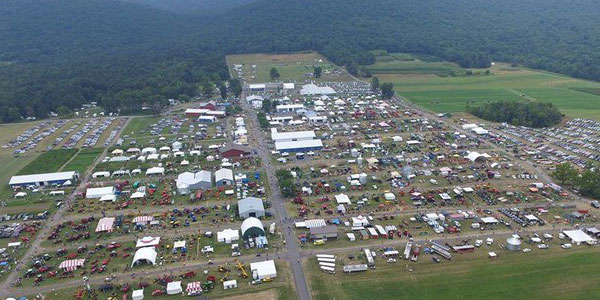(UNIVERSITY PARK, PA ) Visitors at Penn State’s Ag Progress Days, Aug. 15-17, likely will spend most of their time taking in the wide variety of demonstrations, commercial and educational exhibits, presentations and other activities around the 135-acre expo.
But for those willing to wander farther afield, free bus tours to other parts of the surrounding Russell E. Larson Agricultural Research Center and to other nearby facilities will offer a glimpse of Penn State research and extension programs addressing topics such as water quality, pasture and grazing management, industrial hemp, high-tunnel fruit and vegetable production, woodlot management, wildlife habitat and biofuel feedstocks.
Most tours require some walking or standing, and all tours require free tickets that can be obtained at the boarding area, which is located at the corn crib on Main Street, near the headquarters building at the Ag Progress Days site.
This year’s tours feature the following topics:
American Chestnut Foundation Plantings (1.25 hours)
This tour will take visitors to breeding orchards, where they will learn about the history and demise of the American chestnut tree, see how to plant and maintain chestnut trees, and learn about The American Chestnut Foundation’s citizen scientists and programs working to restore the species to Eastern forests.
Habitat Management for Deer and Other Wildlife (1.5 hours)
This tour will focus on food plots and natural habitat management practices used on public or private property as part of a Quality Deer Management System to improve habitat for many wildlife species while producing healthier and larger deer. Visit habitat demonstration plots in the woodlot and neighboring fields.
Dairy Beef Feedlot (1 hour)
The tour will focus on the use of implants in beef production. Participants will see calf-fed Holsteins that have been implanted and compare them to their nonimplanted pen mates. Penn State Extension specialists, industry experts and cattle buyers will be on hand to answer questions.
High Tunnels (2 hours)
High tunnels are inexpensive structures used for extending the growing season and improving yields and quality of vegetables, berries and cut flowers. At Penn State’s High Tunnel Research and Extension Facility, visitors will see strawberries and raspberries being grown in containers in 15 tunnels, with five types of plastics to better manage plant growth, temperatures and pests. The tour also will highlight solar-powered, automated venting options to better manage heat load.
Adaptive Grazing and Soil Health (1.5 hours)
This tour will focus on adaptive grazing management, in which tall grass or high stock density grazing can drastically transform mediocre fields into highly productive pastures that can extend the grazing season well into winter. Experts will discuss the benefits of frequent animal moves; fencing and watering considerations; forage benefits of tall grass grazing; diverse cover crop mixes for use in cropping or grazing systems; and other topics.
Industrial Hemp (1.5 hours)
This tour will showcase Penn State’s first industrial-hemp project in more than 60 years. Researchers will discuss crop-management issues and potential markets for hemp, and visitors will see trials that evaluate several varieties of hemp being grown for seed. Participants also can evaluate hemp produced with no-till methods and look at the impacts of seeding rates, planting dates and fertilizer rates on commercial hemp production.
Short Rotation Woody Crops for Biomass (1 hour)
What are short rotation woody crops? How do they contribute to biomass feedstock? Why are they being promoted for marginal planting sites? What type of species should you grow and who will buy it? Find the answers by visiting a demonstration plot with fast-growing willow and poplar trees. Learn how to grow, harvest and produce this crop as an alternative income opportunity that helps provide sustainable energy supplies.
Multifunctional Stream Buffers and Native Grass Fields (1 hour)
This tour will focus on planting and maintaining trees and shrubs to create a multifunctional stream buffer that will improve water quality, wildlife habitat, livestock health and property value and that will provide edible or medicinal plants. Visitors will learn about the “three Ps” of tree establishment — preparation, planting and protection; see livestock practices such as fencing and stream crossings; learn about financial assistance programs; and get tips on how to plant native grass fields to increase sustainability and help declining pollinators and beneficial insects.
Woodlot Management: Decisions and Actions (1.5 hours)
Visitors can explore the 150-acre Penn State Demonstration Woodlot and gain insights into how management decisions affect future values. The woodlot is managed for multiple objectives, including timber production, wildlife habitat, water quality, recreational activities, research and educational demonstrations. Forestry and wildlife professionals will be on hand to answer questions and identify resources to help forest landowners steward Pennsylvania’s woodlands.
Russell Larson Research Center Farms (2 hours)
This tour will visit each of the research farms at the Russell E. Larson Agricultural Research Center: horticulture, plant pathology, agronomy and entomology. Farm managers will answer visitor questions and present a brief overview of the farm history, current research and student involvement.
Penn State Deer Research Center (1.5 hours)
Visitors can view live deer and learn about deer biology, deer management and current research. The center, near the University Park campus, will open for tours at 5 p.m. on Tuesday and Wednesday. Guests provide their own transportation and must preregister at the tour registration area at the Ag Progress Days site.
Sponsored by Penn State’s College of Agricultural Sciences, Ag Progress Days is held at the Russell E. Larson Agricultural Research Center at Rock Springs, nine miles southwest of State College on Route 45. Hours are 9 a.m. to 5 p.m. on Aug. 15; 9 a.m. to 8 p.m. on Aug. 16; and 9 a.m. to 4 p.m. on Aug. 17. Admission and parking are free.
For more information, visit the Ag Progress Days website. Twitter users can share information about the event using the hashtag #agprogressdays, and Facebook users can find the event at http://www.facebook.com/AgProgressDays.
Report from Morning Ag Clips, Published July 11, 2017
Penn State Ag Sciences News

